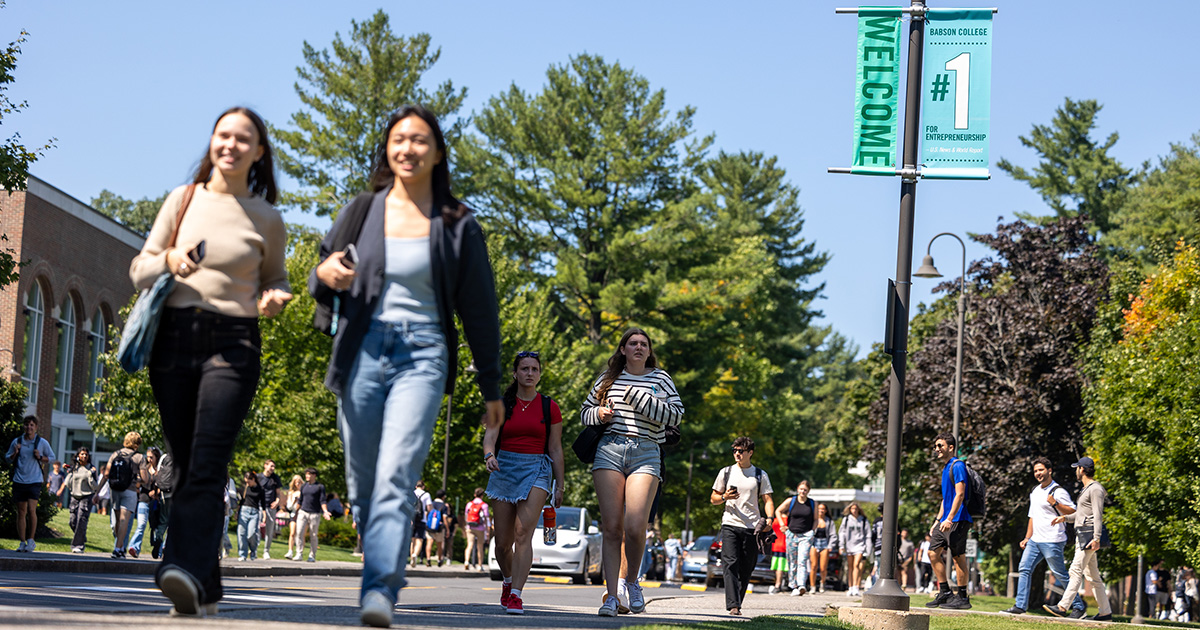The Economic Advantage of Entrepreneurship Education
Its impact is expansive. It can support families, hoist people out of poverty, and advance new products and technology. It can create jobs and boost GDP.
This force for change and uplift is entrepreneurship, and Donna Kelley has seen its influence firsthand in her research. She is part of the Global Entrepreneurship Monitor (GEM) U.S. team at Babson College and a member of GEM’s board of directors. A global consortium of more than 400 researchers, GEM is the first and most developed research program on entrepreneurship in the world. Its latest report, on entrepreneurship in the U.S., was released earlier this month.
“We are generating comprehensive knowledge about entrepreneurship worldwide,” says Kelley, Babson’s Frederic C. Hamilton Professor of Free Enterprise Studies.
That knowledge proves just how potent and important entrepreneurship can be, both for the economic growth of a country and the individual lives of its citizens. If people have the courage and the know-how to start a business, says Kelley, they can take charge of their careers and make a positive impact on their communities in the process.
“We can’t sit back and wait for the world around us to change. We need to empower people,” she says. “Entrepreneurship allows people the opportunity to have control over their lives and careers.”
Entrepreneurship for Everyone
Often when thinking about entrepreneurship, people picture the big, international behemoths, the Microsofts and Facebooks, that were started by entrepreneurs who are household names.
But GEM is interested in all kinds of entrepreneurs, wherever they may reside and however unknown they may be. Sure, entrepreneurs may run tech giants with a global reach, but more often than not, their ventures are more modest in scale: the corner fruit vendor, the hair salon, the neighborhood market.
“All entrepreneurship is local,” says William Bygrave, entrepreneurship professor emeritus at Babson and GEM’s co-founder. That simple statement sums up GEM’s philosophy. Begun as a joint venture between Babson and the London Business School in 1999, the organization has surveyed nearly 3 million people during its 20-year history and examined entrepreneurial activity in 112 economies around the world. Scholars have produced more than 650 peer-reviewed articles using GEM research.
That research reveals a wealth of data in each economy being studied, including the rates of entrepreneurship, the characteristics and motivations of the entrepreneurs themselves, and the social attitudes toward entrepreneurs. Researchers can see what groups in a society tend to start businesses, and what ones find their ambitions constrained, and that information can be used by agencies and governments to form policy. The goal is to encourage everyone to take advantage of entrepreneurship’s transformative potential.
“Entrepreneurship can involve everybody,” says Kelley. “It can include youth, seniors, women, people with different income and education levels and ethnic backgrounds, and those with lifestyle preferences such as the need for flexible work or a desire to be your own boss.”
Education Is Key
Entrepreneurship education is one way to ensure that people are ready and able to start a business. “Education is important. More is needed to spur entrepreneurial activity,” says Julian Lange, leader of the U.S. GEM team and Babson’s Governor Craig R. Benson Professor of Entrepreneurship and Public Policy. “Our data supports the hypothesis that there is a correlation between education and entrepreneurial activity.”
Of course, not everyone who starts a business has gone to school to study entrepreneurship, but GEM researchers say education can help budding entrepreneurs around the world better create a long-lasting enterprise. “Entrepreneurs often think short term,” says Kelley. “They jump into it and don’t think about building a sustainable, growth-oriented organization.”
Entrepreneurship education can teach about marketing, managing employees, tracking finances, and developing a viable product that stands out in the marketplace. “How do you do something that is different?” asks Kelley.
Education can help entrepreneurs deal with the constant uncertainty that comes with building a business. “How do you move forward when you don’t know what the future will be?” asks Kelley. “We try to control what we can and react to the things we couldn’t predict.”
More than that, education can help potential entrepreneurs in search of a big idea, allowing them to spot opportunities that others might miss. “They see the world in a different way,” says Heidi Neck, Babson’s Jeffry A. Timmons Professor of Entrepreneurship, who has worked on Babson’s GEM team in the past.
That different way of thinking, that entrepreneurial mindset, can be a powerful force when unleashed in a country’s citizens. “Entrepreneurship benefits society,” says Lange. “Lives change as entrepreneurs grow.”
Posted in Insights




